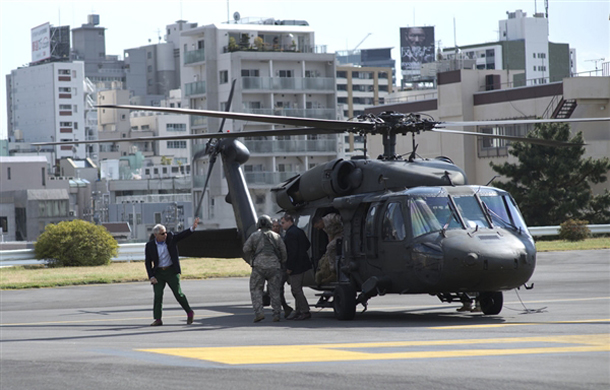

U.S.-Japan Partnership Critical to Regional Security
TOKYO – International News – United States Defense Secretary Chuck Hagel landed in Japan today as part of his fourth official trip to the Asia-Pacific region to reassure the nation’s leaders that the U.S.-Japan relationship is one of America’s strongest partnerships, friendships and treaty relationships.
This evening Hagel met with Japanese Prime Minister Shinzo Abe. According to Pentagon Press Secretary Navy Rear Adm. John Kirby, the secretary thanked Abe for his leadership and for helping the two militaries maintain a strong relationship.
Hagel expressed his firm commitment to the U.S.-Japan treaty of mutual cooperation and security and to working closely with the leadership of the Japanese Self-Defense Forces to improve the nations’ collective capabilities, Kirby said.
The leaders discussed a range of regional security issues, including recent provocations by North Korea, Chinese maritime claims and military activities, and the need for a continued focus on dialogue and cooperation among the United States, Japan and South Korea.
Hagel affirmed strong U.S. support for Japanese efforts at defense reform and thanked Abe for supporting the Japanese government last December in securing a landfill permit for the Futenma replacement facility.
Tomorrow, Hagel will meet with Defense Minister Itsunori Onodera, Foreign Affairs Minister Fumio Kishida and U.S. Ambassador to Japan Caroline Kennedy.
“There are challenges in this part of the world that include Japan’s future,” the defense secretary told reporters traveling with him.
“I’m visiting Japan … not just [to] reconnect and recommit U.S. efforts but to build on the recent meeting President {Barack] Obama had with Prime Minister Abe and South Korean President Park [Geun-hye],” Hagel said, “as we look at new opportunities and challenges in this part of the world.”
He added, “The Japanese-American partnership is a very critical anchor to peace and stability and security in this part of the world, so I look forward to conversations here in the next couple of days with the senior leaders of Japan.”
Even before he landed in Tokyo, Hagel initiated and hosted in Honolulu an informal meeting of defense ministers of the 10 countries that make up the Association of Southeast Asian Nations, or ASEAN. The meeting was the first ever held in the United States.
“The ASEAN defense ministers conference was an important first step in what I’m doing here in the region because it represented the initial effort we have been working on as we continue to collaborate and coordinate with and strengthen our relationships in the Asia-Pacific,” Hagel said.
As President Barack Obama, Secretary of State John F. Kerry and Hagel himself have said many times, ASEAN is an important organization now and will continue to be important, the secretary said, because it represents the collective interests of the region.
ASEAN member countries are Burma, Brunei, Cambodia, Indonesia, Laos, Malaysia, the Philippines, Singapore, Thailand and Vietnam.
“When you add to [this] the ASEAN Defense Ministers Meeting-Plus members [which consists of the 10 ASEAN defense ministers and defense ministers from the United States, China, Japan, South Korea, Australia, India, New Zealand and Russia] … that’s a significant representation of this part of the world,” Hagel observed.
US Rebalancing Asia Pacific Strategy
The U.S. strategy of rebalancing to the Asia-Pacific region “is very much based on these relationships and all their variances and dimensions,” the secretary said, “so to start [his fourth trip to the region in less than 12 months] spending a couple of days with ASEAN members was important.”
Hagel landed here today at Yokota Air Base, whose host unit is the 374th Airlift Wing, and his first visit was with 200 U.S. service members and Japanese Self-Defense Forces troops.
In a hangar on a stage in front of giant flags of the United States and Japan, the secretary brought greetings from President Obama and thanked those from U.S. Forces Japan and their families for their service and sacrifice.
Hagel also thanked those from Japan’s Self-Defense Forces “for what you do for your country and for our partnership, and for helping keep peace and stability in this part of the world.”
In Hagel’s discussions with Japanese leaders, a senior defense official traveling with the secretary said Hagel will have an opportunity to maintain the positive forward motion initiated in Tokyo last fall during the historic Two Plus Two meeting he attended with Kerry.
That progress, the official said, involved work on the bilateral U.S.-Japan alliance to revise the defense guidelines, move forward with the realignment of U.S. military forces in Japan, and strengthen and orient the alliance to focus on 21st century challenges.
Hagel and the Japanese leaders also will discuss building a common understanding of the regional and global security environment.
“Here the secretary will … share perspectives with the Japanese prime minister and defense minister on what they’re seeing on the Korean Peninsula, in the East China Sea and in the South China Sea,” the official said, and conduct important alliance consultations on opportunities and challenges of the international security order.
The senior defense official said Hagel and Japanese officials also would discuss Japan’s relationships with other countries in the region.
“The president and Prime Minister Abe and South Korean President Park had a historic trilateral summit on the sidelines of the Nuclear Security Summit at the Hague recently,” the official said, “and there will be an opportunity to continue underscoring the importance … we see in greater trilateral cooperation among the United States, Japan and South Korea, and the United States, Japan and Australia, and how to move those relationships forward.”
In Washington on April 17-18 the United States, South Korea and Japan will hold a sixth round of Defense Trilateral Talks, the official said, and in late April President Obama will visit Japan, South Korea, the Philippines and Malaysia.
By Cheryl Pellerin
American Forces Press Service







